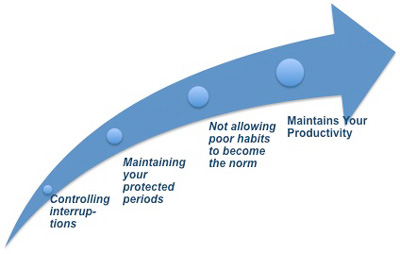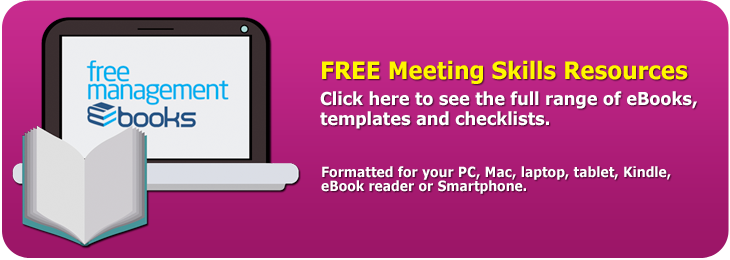Conference Calls and Productivity
Whilst conference calls have undoubtedly brought substantial benefits to organizations by making personnel more productive and saving considerable sums previously spent on travel, they are not perfect as they can have a serious impact on an individual's productivity in a variety of ways explained below:
 |
Controlling Interruptions
You must not allow conference calls to become a constant interruption to your work schedules. You have a responsibility to yourself to carefully consider whether a request to take part in a conference call is the best use of your time and what value you feel you can contribute. It is so easy to be diverted by the ringing of your phone or beeping of a PDA that you often forget to view this interruption in the same way you would a meeting request.
Such calls must be seen as a cost-effective and efficient use of peoples' time, both internally and externally. Your organization and any others that you need to have conference calls with must be educated in how and when these calls are a good use of everyone's time and expertise.
You must do your best to ensure that all conference calls have a purpose, time allocation and that this is known prior to the call. All individuals asked to participate on a call realize who the pivotal person of that call is and that their role is similar to that of 'chair'.
Adopting poor habits
Due to the nature of conference calls and the lack of visual feedback it is very easy for people to let their minds wander away from the topic, especially if the conversation is not being carefully managed as a chair would a meeting. This is compounded by the fact that you are in your own space, which can easily provide its own diversions, breaking into your concentration on the discussion taking place.
For example, if you are working in your own office or study at home you are likely to have your PC or MAC switched on so incoming mails are seen by you immediately. The temptation to open the item and read it whilst the conversation is going on is huge. Someone approaching you to sign off a document or slip a note under your nose is hard to ignore and will also break your concentration on the call.
You will have to be quite self-disciplined to control these types of distractions, as you may be the main instigator of them! Putting the lid down on your portable PC, moving away from the screen and closing your office door will all help to focus your attention on the call. If you don't have your own office you may want to find a quiet area from which to take the call, reducing the number of interruptions.
Protecting your Time
Your ability to ring-fence your time so that you can work undisturbed for a period of time is greatly impaired if you don't treat conference calls in the same way you do any other request for your time. If you have a secretary, you can let them know that you are unavailable for conference calls during certain periods of the day and if you have to take calls at that time then another protected time must be assigned during your schedule.
For those who do not have secretaries, you may want to have a mutual agreement with a work colleague where you act as an interruption buffer for each other whilst you work undisturbed.
You may also be interested in:An Introduction to Conference Calls, Types of Conference Call, Technical Issues Affecting Conference Calls, Human Factor Issues, Maintaining Your Productivity, Adapting Your Communication Style, Advance Planning, Controlling the Call and Conference Call Etiquette.



